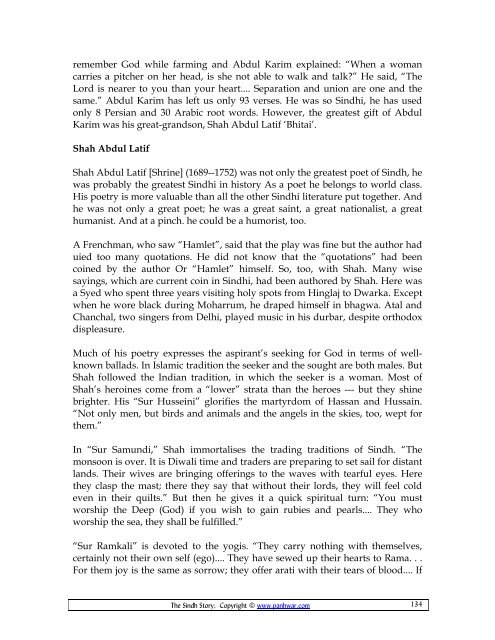Create successful ePaper yourself
Turn your PDF publications into a flip-book with our unique Google optimized e-Paper software.
emember God while farming and Abdul Karim explained: “When a woman<br />
carries a pitcher on her head, is she not able to walk and talk?” He said, “The<br />
Lord is nearer to you than your heart.... Separation and union are one and the<br />
same.” Abdul Karim has left us only 93 verses. He was so Sindhi, he has used<br />
only 8 Persian and 30 Arabic root words. However, the greatest gift of Abdul<br />
Karim was his great-grandson, Shah Abdul Latif ‘Bhitai’.<br />
Shah Abdul Latif<br />
Shah Abdul Latif [Shrine] (1689--1752) was not only the greatest poet of Sindh, he<br />
was probably the greatest Sindhi in history As a poet he belongs to world class.<br />
His poetry is more valuable than all the other Sindhi literature put together. And<br />
he was not only a great poet; he was a great saint, a great nationalist, a great<br />
humanist. And at a pinch. he could be a humorist, too.<br />
A Frenchman, who saw “Hamlet”, said that the play was fine but the author had<br />
uied too many quotations. He did not know that the “quotations” had been<br />
coined by the author Or “Hamlet” himself. So, too, with Shah. Many wise<br />
sayings, which are current coin in Sindhi, had been authored by Shah. Here was<br />
a Syed who spent three years visiting holy spots from Hinglaj to Dwarka. Except<br />
when he wore black during Moharrum, he draped himself in bhagwa. Atal and<br />
Chanchal, two singers from Delhi, played music in his durbar, despite orthodox<br />
displeasure.<br />
Much of his poetry expresses the aspirant’s seeking for God in terms of wellknown<br />
ballads. In Islamic tradition the seeker and the sought are both males. But<br />
Shah followed the Indian tradition, in which the seeker is a woman. Most of<br />
Shah’s heroines come from a “lower” strata than the heroes --- but they shine<br />
brighter. His “Sur Husseini” glorifies the martyrdom of Hassan and Hussain.<br />
“Not only men, but birds and animals and the angels in the skies, too, wept for<br />
them.”<br />
In “Sur Samundi,” Shah immortalises the trading traditions of Sindh. “The<br />
monsoon is over. It is Diwali time and traders are preparing to set sail for distant<br />
lands. Their wives are bringing offerings to the waves with tearful eyes. Here<br />
they clasp the mast; there they say that without their lords, they will feel cold<br />
even in their quilts.” But then he gives it a quick spiritual turn: “You must<br />
worship the Deep (God) if you wish to gain rubies and pearls.... They who<br />
worship the sea, they shall be fulfilled.”<br />
“Sur Ramkali” is devoted to the yogis. “They carry nothing with themselves,<br />
certainly not their own self (ego).... They have sewed up their hearts to Rama. . .<br />
For them joy is the same as sorrow; they offer arati with their tears of blood.... If<br />
The Sindh Story; Copyright © www.panhwar.com<br />
134


